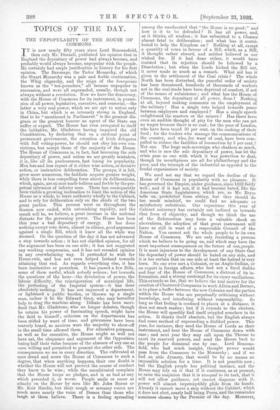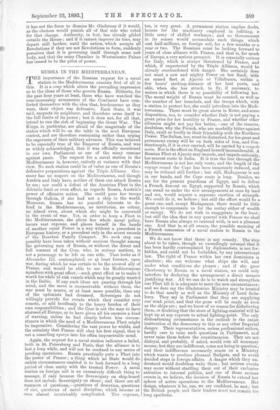TOPICS OF THE DAY.
THE UNPOPULARITY OF THE HOUSE OF COMMONS.
IT is now nearly fifty years since Lord Beaconsfield, then only Mr. Disraeli, published his opinion that in England the depositary of power had always become, and probably would always become, unpopular with the people. He certainly had ample justification in history for his first opinion. The Baronage, the Tudor Monarchy, of which the Stuart Monarchy was a pale and feeble continuation, the Whig oligarchy, and the reign of the bourgeoisie known as the "ten-pounders," all became unpopular in succession, and were all superseded, usually, though not always, without a revolution. Now we have the democracy, with the House of Commons for its instrument, in posses- sion of all power, legislative, executive, and censorial,—the latter a very real power, which we are apt to notice only in China, but which is so intensely strong in England, that to be "mentioned in Parliament" is the greatest dis- grace or the greatest honour an agent of the State can suffer or expect. The House has even arrogated to itself the initiative, Mr. Gladstone having impaired the old Constitution, by declaring that on a cardinal point of permanent government, the retention of Irish delegates with full voting-power, he should not obey his own con- victions, but accept those of the majority of the House. The House of Commons is, in fact, fast becoming the sole depositary of power, and unless we are greatly mistaken, it is, like all its predecessors, fast losing its popularity. Men less and less expect of it either wise action, or decisive action, or instructive deliberation. The groups, it is felt, grow more numerous, the faddists acquire greater weight, while there is less compelling force about its deliberations, which, again, are at once made tedious and feeble by the per- petual intrusion of inferior men. There has consequently been visible a growing inclination to limit the action of the House as a whole, to leave authority wholly to the Cabinet, and to rely for deliberation only on the chiefs of the two great parties. This process went on throughout the Session now ended, with astonishing rapidity, and the result will be, we believe, a great increase in the national distaste for the governing power. The House has been this year a bad depositary of energy. It has done nothing except vote down, almost in silence, good argument against a single Bill, which it knew all the while was doomed. On the question of the day it has not advanced a step towards action ; it has not clarified opinion, for all the argument has been on one side; it has not suggested any working compromise, and it has not revealed opinion in any overwhelming way. It pretended to wish for Home-rule, and has not even helped Ireland towards attaining that end. As regards everything else, it has been inattentive or powerless. It has passed a few Bills, some of them useful, which nobody notices; but 'towards the questions of the hour—the devolution of power, the labour difficulty, the reinvigoration of municipal life, the perfecting of the Imperial system—it has done absolutely nothing. It has. not improved a department, or lightened a public burden, or thrown up a single man, unless it be Sir Edward Grey, who may hereafter help to drag the machine along. Debate has been sacri- ficed that Mr. Gladstone, who no longer debates, though he retains his power of fascinating speech, might have the field to himself ; criticism on the departments has been stifled by want of time, and grievances have been scarcely heard, so anxious were the majority to show-off in the small time allowed them. For educative purposes, as well as for executive, the House might as well not have sat, the eloquence and argument of the Opposition losing half their value because of the absence of any one at once willing and permitted to present the other side. The consequences we see in every direction. The cultivated at once dread and scorn the House of Commons to such a degree, that when anything happens, their one doubt is whether the House will not prevent the course of conduct they know to be wise ; while the uncultivated complain that the House keeps no pledges, and is as bad as any which preceded it, or worse. People smile or sneer at attacks on the House by men like Mr. John Burns or Mr. Keir Hardie, but their rough or screamy voices are much more nearly the voice of Demos than those who laugh at them believe. There - is a feeling spreading among the uneducated that "the House is no good;" and how is it to be defended ? It has all power, and, as it thinks, all wisdom ; it has submitted to a Closure almost fatal to deliberation ; and what has it contri- buted to help the Kingdom on ? Nothing at all, except a quantity of votes in favour of a Bill, which, as a Bill, it thought rather absurd, and neither believed in nor wished for. If it had done either, it would have insisted that its rejection should be followed by a Dissolution ; but when the Lords kicked the Bill out, it never made so much as a remark. What aid has it given to the settlement of the Coal crisis ? The whole North has been disturbed, the peaceful order of society has been threatened, hundreds of thousands of workers not in the coal-trade have been deprived of comfort, if not of the means of subsistence ; and what has the House of Commons, the depositary of all power, done ? Nothing at all, beyond making comments on the employment of the military ! Has a single vote helped towards peace between employers and employed ? Has a single speech enlightened the masters or the miners ? Has there been even an audible thought of pity for the men who can get no wages because there is no coal ; for the poor of London, who have been taxed 30 per cent, on the cooking of their food ; for the traders who manage the communications of the country, and who, for want of coal, have been com- pelled to reduce the facilities of locomotion by 5 per cent.? Not one. The huge mob-sovereign who chatters so much, and who is now the sole depositary of power, has let the crisis pass as one with which it was powerless to deal,, though its mouthpieces are all for philanthropy and the poor, and the triumph of the industrial as opposed to the feudal organisation of society.
We need not say that we regard the decline of the House of Commons in popularity with no pleasure. It has governed the Empire, under guidance, since 1832 fairly well ; and if it had not, if it had become hated, like the- American State Legislatures, which are, as Mr. Bryce tells us, prohibited from sitting, lest they should do too much mischief, we could find no adequate or satisfactory substitute. Our experience this year of Cabinet autocracy has certainly not inclined us towards that form of oligarchy, and though we think the use of the Referendum may form a valuable check on aberrations, the adoption of that great instrument will leave us still in want of a respectable Council of the Nation. You cannot ask the whole people to be its own House of Commons. We are only recording a process which we believe to be going on, and which may have the most important consequences on the future of our, people. It is most injurious to the development of any State that the depositary of power should be hated on any side, and it is too certain that on one side at least the hatred is very keen. No one ever met a Colonist, or an Anglo-Indian, or an expert in foreign affairs, who had not a fixed dislike and fear of the House of Commons, a distrust of its in- formation, and a strong contempt for its viewy vacillations.. This extends so far, that we believe the real motive for the creation of Chartered Companies to work Africa and Borneo,. is to place a buffer between the new Colonies and the parties within the House who are perpetually criticising without knowledge, and interfering without responsibility. So long as that feeling is confined to places at a distance, it does not much matter ; but if it extends to the electors,' the House will speedily find itself crippled somehow in its action. It thinks itself absolute, but the English always find some method of superseding a disliked power. This year, for instance, they used the House of Lords as their instrument, and beat the House of Commons down with ease ; and next year they may call upon the Throne to. exert its reserved powers, and send the House back to- the people for dismissal one by one. Lord Beacons- field, who had much insight, thought power would pass from the Commons to the Monarchy ; and if we had an able dynasty, that would be by no means an impossible solution for a time. It is not possible now ; but the English people has political instinct, and the House may rely on it that if it continues, as at present, to raise the suspicion that it is unequal to its task, that it will not allow guidance, yet cannot dispense with it, power will almost imperceptibly glide from .its hands. Already it cannot move a step without the Cabinet, which it does not elect, nearly half being Peers, and the remainder nominees chosen by the Premier of the day. Moreover,, it has not the force to dismiss Mr. Gladstone if it would, as the electors would punish all of that side who voted for that change. Authority, in fad, has already glided outside the House ; and if it cannot improve its tone, may depart still farther, until the nation, which accepts all Revolutions if they are not Revolutions in form, suddenly perceives that it is governing itself through some new body, and that the noisy Chamber in Westminster Palace has ceased to be the pivot of power.



































 Previous page
Previous page